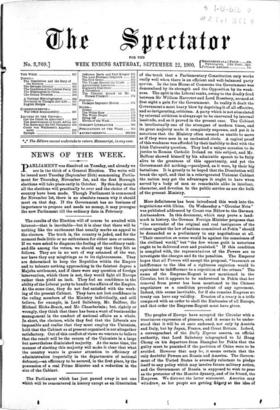The results of the Election will of course be awaited
with interest—that is inevitable—but it is clear that there will be nothing like the excitement that usually marks an appeal to the electors. The truth is, the country is jaded, and for the moment feels little or no enthusiasm for either men or causes. If we were asked to diagnose the feeling of the ordinary rank- and-file among the voters, we should say that they felt as follows. They are in no sort of way ashamed of the war, nor have they any misgivings as to its righteousness. They are determined to keep the Republics within the Empire and to tolerate nothing approaching in the faintest degree a Majuba settlement, and if there were any question of foreign intervention, which there is not, they would fight all Europe rather than yield an inch. They feel no confidence in the ability of the Liberal party to handle the affairs of the Empire. At the same time, they do not feel satisfied with the work- ing of the present Cabinet. They have not lost confidence in the ruling members of the Ministry individually, and still believe, for example, in Lord Salisbury, Mr. Balfour, Sir Michael Hicks-Beach, and Mr. Chamberlain; but, rightly or wrongly, they think that there has been a want of businesslike management in the conduct of national affairs as a whole. In short, the electors, while they feel that the Liberals are impossible and realise that they must employ the Unionists, hold that the Cabinet as at present organised is not altogether satisfactory. Out of this conflict of views we venture to believe that the result will be the return of the Unionists in a large but nevertheless diminished majority. At the same time, the manner of electing this majority will make it clear that what the country wants is greater attention to efficiency of administration (especially in the departments of national defence),—an efficiency to be secured, in the first place, by the possession of a real Prime Minister and a reduction in the size of the Cabinet.






































